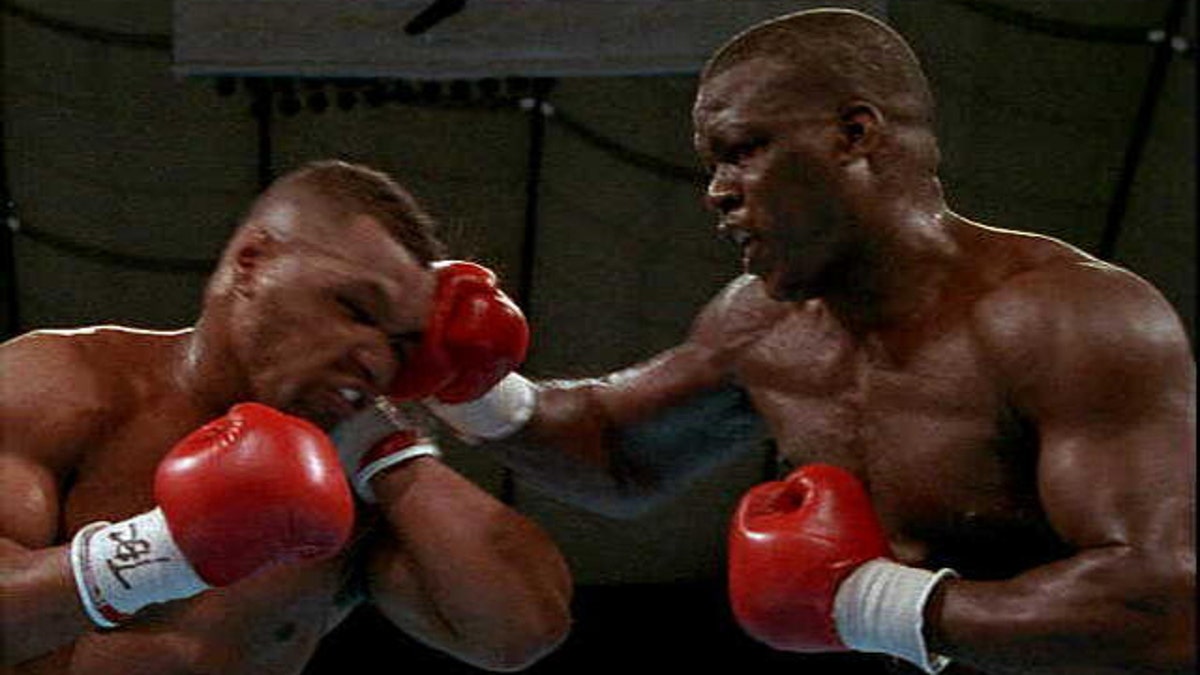
Buster Douglas (R) and Mike Tyson (L) in 1990 (AP)
Superstar athletes Alex Rodriguez and Marion Jones deceived their fans by breaking the rules. Others, like LT, Tiki and Tiger were undone by their own tragic flaws. Regardless of whether we should elevate people to heroic status solely because they excel at sport, we do. And when they fail, we feel that they’ve broken their side of the bargain and we are unyielding. But when a fallen athlete has the grace to make it right, he reveals a depth of character that exceeds his considerable God-given talent. That’s when we realize that some athletes do deserve to be role models, albeit later in life. Like James “Buster” Douglas.
“Tyson had that snarl. His aura was so great that nothing else mattered. He had that devastating power, the way he took guys out. People couldn’t comprehend that someone could fight him and win,” says Douglas, the former undisputed Heavyweight Champion who dethroned Tyson, and is now author of “Buster's Backyard Bar-B-Q, Knockout Diabetes Diet”.
The 1963 National Golden Gloves Middleweight Champion and Light Heavyweight contender, William “Dynamite” Douglas taught his son that in any match between two well-conditioned athletes, the most mentally fit fighter will win. “My father was a dominating fighter who talked about putting your will on the other fighter and being prepared to handle things that arise during a fight,” says Douglas. “I experienced fighting through my father’s eyes even before I started boxing.”
On February 10, 1990, 42 to 1 underdog Douglas KO’d Tyson in the tenth round -- the first time Tyson ever went down. On October 25, 1990, Holyfield KO’d Douglas in the third round. Four years later, Douglas’ weight soared to 450 pounds and he lay close to death in a diabetic coma. Dream over.
While training for Tyson, Douglas’ wife left him, the mother of his son, Lamar, was diagnosed with leukemia, and just twenty-three days before the bout, his mother and best friend, Lula Pearl, suddenly died. “Every other week there was something new that was catastrophic,” he says. These tragedies made the prospect of losing in the ring no big deal, he says, because he’d already suffered the worst. “I was able to stay focused. I was confident that this was my time. It was my time. The physical was good, mentally I got it going, prepared to handle anything that arose in the ring.” But not what arose in the aftermath.
Douglas has said of fame, “You think it’s going to be all sunshine. You look down in your hands, and it’s like, man, it’s a bunch of snakes.”
When he walked through the airport en route to the Tyson matchup, “it wasn’t nothing. No ‘hey, good luck.’” He returned a household name. “I couldn’t believe it. People reacted to me kind of like I was from another planet. Me, I was just the same guy.” He pauses, then chuckles, “who just happened to be the new heavyweight champion of the world.”
Rudderless without his mother, Douglas says, “I had no discipline. I spiraled out of control.” He became a caricature, living a life of orgiastic excess until his coma gave him a second chance. He lost 200 pounds in the next two years, staged a comeback, won his next six fights and retired in 1998. He learned to love life again but he didn’t love eating.
“There was not a lot I enjoyed eating under the diabetic umbrella,” says Douglas. “Diabetes, man, has a strict regimen and you’ve got to change your lifestyle. I mean, overnight, bam gotta do it.” One day while hanging out with friend Tony Reynolds, who had lost his father to diabetes, they pooled recipes culled from families and friends. “Over the course of the years, we got creative, got some really nice tasting recipes so we put them in a book.”
Part cookbook, part living with diabetes manual, it’s filled with easy, flavorful recipes like Beef Teriyaki, Pork Chops with Sweet Dijon, Creole Halibut, Dutch Apple Pie, Barbecued Beans and Douglas’ favorite, Bar-B-Q Sauce for Diabetics. Rod Grey, America's current Grand Champion Pit Master loves it. The whole idea, Grey says, is to help people deal with their fear of the disease and let them know that there can still be joy in eating.
When asked what’s next, Douglas replies, “Right now, I gotta do some laundry. Seriously, I do.” And he’s preparing for the September 27 Lula Pearl Celebrity Invitational Golf Tournament at The Ohio State University honoring his mother. “Life’s about being normal. When someone recognizes me and says, ‘You got a moment, can I talk to you?’ I say, ‘Sure.’ It’s all good.” And it’s about spending time with sons, BJ, a sophomore starting linebacker at Otterbein College and Artie, a three-sport high school athlete. And it’s about his car. “I got a ’70 Caddy DeVille. My dad had a ’69. I just got to do a few more things on it.” He bought it in ’87.
His advice for his sons should they achieve the success he had: don’t get caught up in the hoopla; don’t listen to all the people telling you how great you are; stay grounded and be the man you’ve always been.
Some say had he postponed Holyfield for six months to a year, grieved for his mother and found his bearings, he’d have won. Douglas says only that he had his moment, a moment that lead to the other great experience of his life. Meeting Muhammad Ali.
“Ali told me during the fight he was jumping up and down cheering for me. For me! One of the greatest fighters of all time telling me that. Imagine that. That was the ultimate dream.”
About fellow Ohioan LeBron James’ decision to go to Miami, Douglas says he would have liked to have seen LeBron stay. “But you know, I have DirectTV so I can still watch him. Life’s good.”
